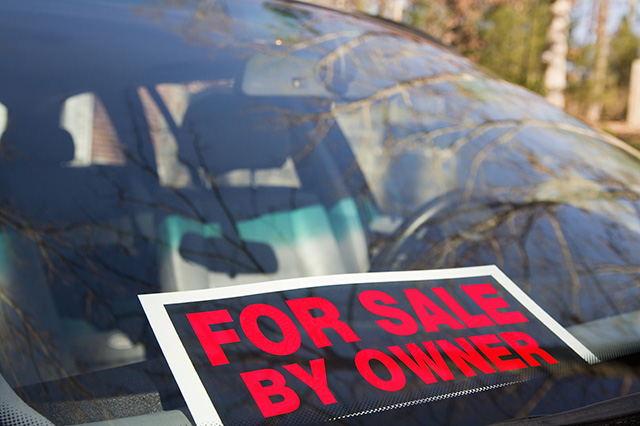When it comes time to say goodbye to your car, you might consider selling it. If so, there are a few steps you should take when preparing to sell your car. Even though some of these tasks may seem very simple, they will go a long way.
Here’s how to sell your car – and for a good price.
Start With Basic Car Maintenance
First thing’s first: You need to make sure your car is in good working order and there are no lingering mechanical problems hiding under the hood (or any other part of the vehicle). Start with the basics, such as topping off all the fluids and taking a few minutes to clean up the engine compartment.
If you find something that needs repairing, get it fixed regardless of how minor the damage might be. “Something as inexpensive as a headlight that is out or a torn wiper blade gives the impression that you didn’t care for the vehicle,” says AAA’s Car Doctor John Paul. If the repair is simple enough, you can probably handle it yourself without having to pay a mechanic.
Paul goes on to add that if the vehicle has a check engine, anti-lock braking system or airbag warning light on, you might want to consider repairing these items. Potential buyers will be turned-off to a vehicle with warning lights on the dash.
Find a AAA Approved Auto Repair Facility near you.
Fix or Disclose Any Major Issues
When it comes to more significant repairs, it is always a challenge: Do you fix things that are wrong or just let the prospective buyer know that something is going to need repair? “As a general rule, it is better to get a written estimate on the cost of the repairs than spend the money and hope to get more for your car,” Paul says. “An example is a car that will need four tires in the near future. Replacing the tires on an SUV could cost $600-$800 and chances are you won’t get $800 more for the vehicle when you sell it.”
In states with vehicle inspection, selling a car with maintenance issues that will prevent the new buyer from passing a state inspection is a problem. You could be in violation of your state’s lemon law.
In Massachusetts, for example, if the buyer discovers a defect and can prove that you knew about it but failed to disclose it, the sale can be canceled within 30 days of purchase. In such a case, you’ll have to refund the buyer.
Regardless of your state’s laws, it is important to disclose any issues. “If there are serious mechanical problems and you fail to disclose those problems even 30 days later, you could be held responsible and end up in small claim court,” Paul said.
When all is said and done, collect all of your repair and maintenance records. Potential buyers will want to see how you have been taking care of your car.

Clean It
Nobody wants to ride in a dirty car, let alone buy one. If the car smells it won’t sell.
Make sure your car is looking its best by washing and waxing it. Wash and wax the exterior, touch up any paint chips or scratches, and clean and dress the tires. Vacuum and clean the interior, shampoo the carpet and wipe down the interior trim. Clean the windows inside and out as well.
Determine the Price
Setting the right price can make or break the sale of your car. Over estimating the condition of your car and the price will limit potential buyers. Therefore, pricing the vehicle accurately is of the utmost importance. Fortunately, there are numerous resources that can provide this information. And most of them are available at just the click of a button.
Kelley Blue Book and NADA Guides are your two best bets. Both sites can give you a quick, reliable value of your vehicle after you plug in simple information such as make, model and mileage.
Get Eyeballs on It
There was a time when your only hope of getting your car noticed was to put a “For Sale” sign in the window and hope you drove past the right person. Nowadays, there are a host of outlets you can use to get your car in front of the masses. Sites such as Craigslist, Facebook Marketplace, Autotrader, iSeeCars.com and CarGurus.com are just a few of the options.
Have you ever sold your car? How did it go? Let us know in the comments below.
When it’s time to buy a new car, don’t forget about the AAA Auto Buying Program and Auto Loans.
8 Thoughts on “How to Sell Your Car”
Leave A Comment
Comments are subject to moderation and may or may not be published at the editor’s discretion. Only comments that are relevant to the article and add value to the Your AAA community will be considered. Comments may be edited for clarity and length.














One of the issues of concern is how payment is paid, checks need 5 day to clear, cash is one of the safest way to go. Remember once you sign over a Title it’s their car .
I am looking to sell a 2004 Honda CRV EX that has over 197,000 miles on it. I don’t want to have to spend money to have all the things mentioned in this article done. Can I sell it “as is” since it is an older car, it runs, but needs work?
Hi Kathy, thanks for the question. Here’s an answer from our Car Doctor, John Paul: At 18 years old, most buyers would not expect a perfect car and would expect to put money into repairs. I would sell it letting the buyer know if anything is wrong that you know about. There is no warranty when selling a car privately, but depending on where you live it does need to pass state inspection. In MA where I live, the buyer has 7 days to get the car inspected. If it fails and the cost of the repairs is more than 10 percent of the sale price, the buyer can return the car. Other than that no warranty.
How about donating a car. My van isn’t worth much and I don’t need to trade it in. What are the best ways to donate a vehicle?
Hi Reginald, here’s an answer from John Paul: You can donate a vehicle and the standard deduction according to last year’s IRS rules is $500. The only way you can deduct more from your taxes is to have the vehicle appraised or have a receipt for what it sold for from the charity. There are many charities, my suggestion is find one the mirrors your own values. Some people donate to NPR, others the Salvation Army and other local Vocational schools. Many people use Charity Navigator to check on a charity. Personally I prefer CarDonationWizard.com
I donated my vehicle to Salvation army 2 years ago. it had seen better days not to mentioned rocker panels rusted.
Great article on How to Sell Your Car. Can you possibly offer additional information such as; 1. where and how to meet prospective buyers and preserve personal safety, 2. how to negotiate the price you want, 3. what documents need to be signed if any, 4. what to do with license plates, registration sticker, inspection sticker, 5. acceptable forms of payment and how to avoid being defrauded, 6. does the buyer need to know your address, phone number, social security number 7. does the state, county or DMV need to be notified of the sale and if so how to do that. Thank you Rob Resnick
IN addition to Rob’s issues above, do taxes have to be paid on the sale? if so, who pays them? do you need a bill of sale? what websites charge a fee to advertise the sale?